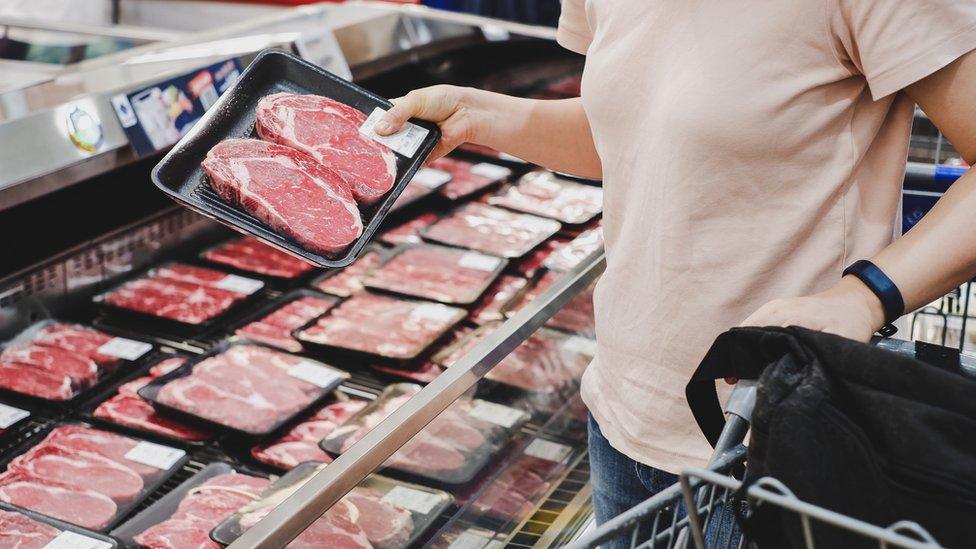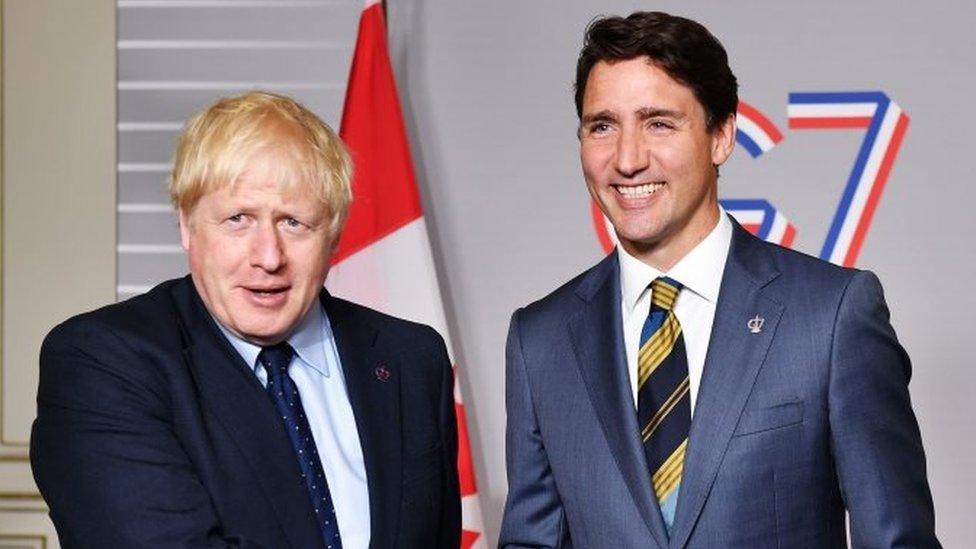UK halts trade negotiations with Canada over hormones in beef ban
- Published
- comments

Negotiations between the UK and Canada on a post-Brexit trade deal have broken down after nearly two years, following a row over beef and cheese.
Canada has been pushing for the UK to relax a ban on hormone-treated beef, which its producers say in effect shuts them out of the British market.
The UK have concerns about 245% import taxes Canada put at the start of the year on British cheese.
The pause in talks mean British car firms could also face higher tariffs.
It will also mean the UK's trading terms with Canada will now be worse than when it was part of the EU's deal with the country.
Minette Batters, president of the National Farmers' Union of England and Wales, said she was glad the UK government had not "given way" on hormone-treated beef.
But the British Chambers of Commerce (BCC) and the Society of Motor Manufacturers and Traders (SMMT) described the news as unwelcome.
Downing Street said the government would "only negotiate deals that deliver for the British people", and reserved the right to "pause negotiations where progress is not being made".
But a spokesperson added: "We're open to restarting talks with Canada in the future."
No 10 dismissed a suggestion that Brexit had left the UK worse off in terms of international trade, saying it was a "benefit of our independent trading status that we are able to insist on the detail of each and every deal to ensure that it works specifically in the UK's interests".
Trade between the two countries currently takes place under the terms of a deal the UK rolled over from its time as an EU member.
A time-limited agreement allowed the UK to continue to sell cars and cheese without high import taxes. But talks about extending these as part of a new deal have now broken down.
The arrangements for cheese ended on 31 December 2023 leading to taxes of up to 245% on British imports, while the car deal is due to expire in April.
This is the first time the UK has formally suspended talks with a trade partner since formally leaving the EU trading regime in 2021.
Talks between the two countries on reaching a bespoke agreement had been taking place since March 2022.
'Relief' for UK farmers
A spokeswoman for Canada's trade minister Mary Ng said she was "disappointed" at the pause in talks, and had communicated this to UK Business Secretary Kemi Badenoch.
"Their decision to continue to maintain market access barriers for our agriculture industry and unwillingness to reach a mutual agreement has only stalled negotiations," the spokeswoman added.
"The UK is a long-standing trading partner and I am confident that we can negotiate an agreement that is win-win for Canada and for the UK.
"But let me be clear - we will not negotiate an agreement that is not good for Canadians - and not good for our Canadian businesses, farmers and workers".
Total goods trade between the two countries was worth £19.2bn in 2020, according to the UK government, external, with UK imports from Canada worth £7.3bn and UK exports to Canada worth £11.8bn.
Ms Batters said the UK's decision would be a "relief for farmers".
She told BBC Radio 4's Today programme she was pleased the "government has stuck to its line and not given way".
"We have already damaged our economy and agricultural sector by fully liberalising on trade deals with Australia and New Zealand. We had to take a strong line on this."
However, William Bain, trade policy head at the BCC, said: "For our dairy exporters and parts of our manufacturing industry the loss of key trade preferences puts them in a worse position than before 2020.
"Government must help these sectors through difficult times and open up new markets for our goods and services."
Mike Hawes, the chief executive of the SMMT, said the breakdown in talks sent "a signal that the UK's world-class automotive products are not welcome in Canada".
"If UK car exports can't use EU parts and components to avoid additional duties it creates a risk that tariffs, potentially charged on top of luxury goods taxes, could be reintroduced," he added.
'Weaker'
The Canadian Cattle Association said it backed its government's "hard-line approach" on beef rules, adding that the UK had "shown no indication that it is prepared to fully accept Canada's food safety system which is widely recognized as one of the finest in the world".
Labour's shadow business secretary Jonathan Reynolds said: "This is very concerning news and another significant failure from the Conservatives to honour their promises.
"Rather than strengthening our trading position post-Brexit these failures have left us in a weaker position, particularly for the automotive sector."
SNP international trade spokesperson Richard Thomson said: "Westminster's Brexit has damaged the UK's potential for global trade and has dragged Scotland's economy down with it."
Former Environment Secretary George Eustice told the BBC the UK was "absolutely right to suspend negotiations", and that Canada should "accept the need to comply with British food standards".
Mr Eustice, who was fiercely critical of the UK-Australia trade deal, said the government had to ensure that "any access granted for hormone free beef from Canada is matched with access for UK dairy into the Canadian market".
Commons Speaker Sir Lindsay Hoyle expressed frustration that the halting of the talks was announced to the media before MPs.
"I will say it is amazing how quickly the government come to give good news... I always believe this House should hear it first," he said.
- Published21 November 2020
